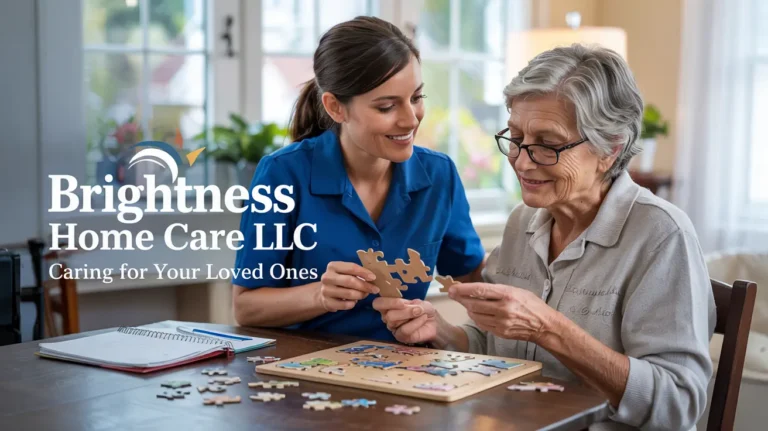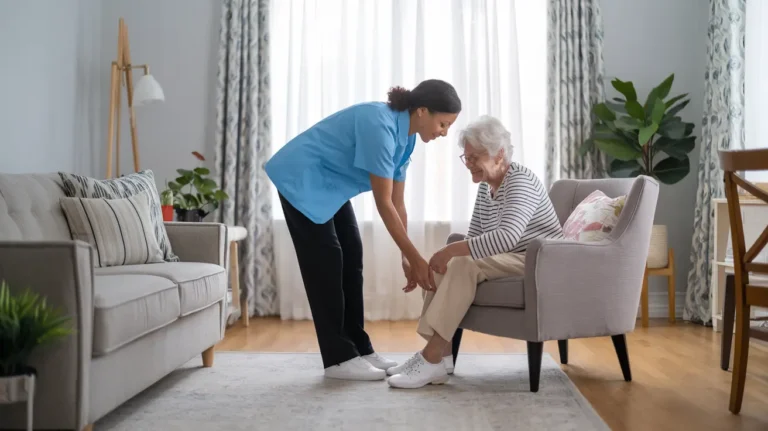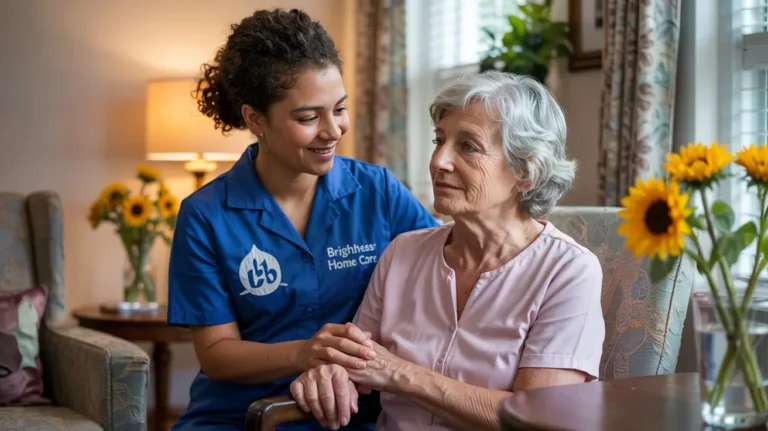Essential Memory Care Resources in Indianapolis: A Comprehensive Guide by Brightness Home Care
I’ve been working with families dealing with memory care issues for nearly 15 years now, and let me tell you, it’s never an easy conversation to have. About 1 in 9 people over 65 in the Indianapolis area shows signs of Alzheimer’s or related conditions — that statistic still floors me every time I think about it.
When my own aunt started misplacing her keys and forgetting appointments, we brushed it off as normal aging. Big mistake! I wish someone had told me then what I’m telling you now: memory issues deserve attention sooner rather than later.
Recognizing when memory care is needed can be tricky. It’s not just about forgetfulness — it’s when you notice your loved one getting confused about familiar places, struggling with simple tasks like making coffee, or showing personality changes that seem out of character. I remember one client who kept her refrigerator spotlessly organized for decades suddenly couldn’t remember where the milk went. That’s when her daughter called me, concerned.
Memory care differs significantly from standard assisted living. While assisted living provides support with daily activities, memory care offers specialized programs specifically designed for cognitive conditions. The environments are secured to prevent wandering (something I learned the hard way when my neighbor’s father with dementia was found three blocks away in his pajamas), and staff receive specialized training in dementia behaviors and communication techniques.
Here in Indianapolis, we’re seeing more families seeking assessment for their loved ones. The process typically involves cognitive testing, medical history reviews, and daily functioning evaluations. Don’t be intimidated by this! At Brightness Home Care, located at 4911 West 38th Street, we’ve guided hundreds of families through this process with compassion and clarity.
What many folks don’t realize is that Indianapolis actually has a higher-than-average rate of memory care needs compared to similar-sized cities. Some researchers attribute this to our older population demographics and longer life expectancies in central Indiana. This means our community has developed robust resources to meet these needs — though navigating them can feel overwhelming at first.
I’ve made so many mistakes myself when helping my own family members. One time, I thought all memory care facilities were basically the same and didn’t do enough research. Trust me, there’s HUGE variation in quality and approach! That’s why it’s crucial to understand the specific needs of your loved one before making any decisions.
If you’re noticing concerning patterns with your loved one, don’t wait like I did. Early intervention can make a tremendous difference in quality of life and disease progression. Many families I’ve worked with express relief after getting proper support, saying things like, “I wish we’d done this sooner.”
Top Memory Care Facilities in Indianapolis
When I first started researching memory care facilities for my mother-in-law, I was completely overwhelmed by the options here in Indianapolis. There are basically four main types you’ll encounter: dedicated memory care communities, assisted living with memory care wings, nursing homes with memory units, and specialized memory care providers like Brightness Home Care that focus on in-home solutions.
I’ll never forget visiting one facility that looked gorgeous in the brochure but felt cold and institutional in person. That taught me a valuable lesson! When evaluating facilities, look beyond the fancy furniture and pay attention to how staff interact with residents. Are they calling residents by name? Do they seem rushed or patient? These subtle cues tell you so much about the quality of care.
What sets excellent memory care apart from mediocre options? In my experience, it comes down to staff training, personalized care plans, appropriate activities, and safety features. The staff-to-resident ratio is super important too — I’ve seen places where one caregiver is responsible for 15 residents, which just isn’t enough for proper memory care.
At Brightness Home Care on West 38th Street, we’ve developed specialized memory care services that focus on consistency and familiar environments. This approach stems from my own frustrating experiences trying to help my uncle adjust to new surroundings when his dementia progressed. He would get agitated and confused in unfamiliar places, which is why I became passionate about home-based memory care solutions.
The cost of memory care in Indianapolis can give you serious sticker shock! Typically, facility-based care runs between $4,500 to $7,000 monthly, depending on location and level of care needed. I learned the hard way that Medicare doesn’t cover most memory care, and I’ve seen too many families drain their savings before learning about available financial assistance programs.
Planning ahead is crucial! I recommend families look into long-term care insurance before a diagnosis, explore veterans benefits if applicable, and consult with elder law attorneys about estate planning. One client told me they wished someone had advised them to set up a financial plan five years earlier before their mother’s diagnosis.
When touring facilities, bring this checklist (I created it after making my own mistakes): Ask about staff turnover rates (high turnover is a red flag), inquire about how they handle difficult behaviors without overmedication, observe a meal time if possible, ask about family involvement policies, and find out about their fall prevention protocols.
I’ve seen amazing results when families find the right fit. One gentleman I worked with who barely spoke at his previous facility started participating in group activities and reconnecting with family after moving to a place with a more appropriate approach to his specific needs. It just shows that the right environment makes all the difference!
In-Home Memory Care Services in Indianapolis
I discovered the power of in-home memory care completely by accident. My neighbor Sarah was struggling with her mom’s early-stage Alzheimer’s and refused to consider “putting her in a home.” Seeing her exhaustion, I suggested trying home care a few hours weekly. Six months later, both were thriving with the right support system! That’s when I truly understood that familiar surroundings can sometimes be the best medicine for memory conditions.
The research backs this up too — people with memory issues often experience less confusion, anxiety, and behavioral issues when they remain in familiar environments. I’ve seen folks who were combative in facilities become calm and cooperative once back home with proper support. There’s something powerful about waking up in your own bedroom surrounded by photos and mementos that trigger positive memories.
At Brightness Home Care in Indianapolis, we’ve designed our memory care services specifically for this home advantage. Our team receives specialized dementia care training that goes way beyond basic caregiving. I insist on this because I once hired a caregiver for my aunt who had zero dementia experience, and it was a disaster! Now I make sure our team understands redirection techniques, validation therapy, and how to recognize subtle communication cues from clients who struggle with verbal expression.
Creating a safe home environment is crucial and often overlooked. I learned this the hard way when a client’s father turned on the stove and forgot about it. Now we conduct thorough home safety assessments addressing fall risks, wandering prevention, and kitchen safety. Simple modifications like removing trip hazards, installing bathroom grab bars, and using stove safety devices can make aging in place possible even with advancing memory conditions.
The daily routine is super important for memory patients — I can’t stress this enough! When I worked with Mr. Johnson, his agitation always peaked around 4pm. After some trial and error, we discovered that incorporating a calming activity like listening to big band music before dinner dramatically reduced his “sundowning” symptoms. These personalized routines become anchors throughout the day.
What makes in-home memory care special is the one-on-one attention. In facilities, even the best ones, staff must divide attention among many residents. At home, caregivers can fully focus on your loved one’s specific needs and preferences. Does Mom always fold napkins a certain way? Does Dad need his coffee prepared just so? These small details matter enormously to someone with memory issues, and consistent caregivers can honor these preferences.
Many families tell me they worry about isolation with home care, but we address this by incorporating community engagement whenever possible. One creative caregiver takes her client to the same coffee shop twice weekly where the staff know them by name. These small community connections maintain dignity and social skills even as memory declines.
I’d be lying if I said in-home care is always the answer. For some clients with advanced needs or certain home situations, facility care becomes necessary. But for many Indianapolis families, quality in-home memory care from Brightness Home Care offers the best of both worlds — professional expertise delivered in the comfort of home.
Community Support Groups and Resources for Caregivers
I’ll never forget my first caregiver support group meeting. I went reluctantly, convinced no one could possibly understand what I was going through with my father’s dementia. Two hours later, I left with three phone numbers, a recommendation for a neurologist, and the first good laugh I’d had in months. That experience completely changed my caregiving journey.
Indianapolis is actually blessed with some amazing resources for memory care families. The local Alzheimer’s Association chapter runs fantastic programs, including their 24/7 helpline at 800-272-3900 that’s saved my sanity more than once! They offer everything from educational workshops to support groups across the city. Their office at 50 E. 91st Street hosts regular events, but they’ve also expanded to virtual offerings since the pandemic.
Support groups are the unsung heroes of the caregiving world. In Indianapolis, you’ll find groups specifically for adult children of parents with dementia, spouses of memory care patients, early-stage memory loss support, and even groups focused on specific conditions like Lewy body dementia. I recommend trying a few different groups before settling on one — the chemistry and fit matter so much.
I remember feeling so guilty the first time I considered respite care. How could I leave dad with strangers when he needed me? Then my doctor bluntly told me I’d be no good to him if I ended up in the hospital from exhaustion. She was right! Indianapolis offers several respite options, from a few hours of in-home relief to short-term facility stays. Brightness Home Care on West 38th Street specializes in respite care that maintains your loved one’s routine while giving you a much-needed break.
The educational workshops available locally have been game-changers for many families I work with. Joy’s House hosts a wonderful “Caregiver Crossing” program with practical tips. CICOA Aging & In-Home Solutions offers their “CareAware” series covering everything from managing difficult behaviors to navigating the healthcare system. St. Vincent’s Hospital periodically runs a comprehensive caregiver training series that I highly recommend.
Online resources have exploded in recent years, and I’m so grateful for that! During those 3 a.m. moments when you need answers but can’t call anyone, websites like alz.org/indiana and indianacaregiver.org are invaluable. The Indiana Association for Home & Hospice Care also maintains a terrific resource directory specific to Indianapolis memory care options.
What many caregivers don’t realize is that your own self-care isn’t optional — it’s essential. I learned this lesson the hard way after my own health collapsed from caregiver stress. Now I make sure every family I work with at Brightness Home Care has a self-care plan. Even 15 minutes daily of intentional stress relief can make a difference in your caregiving stamina.
I’ve seen too many Indianapolis caregivers try to go it alone until they reach crisis point. Please don’t make that mistake! Reach out early and often to these community resources. Not only will you find practical help, but you’ll discover you’re part of a community who truly understands your challenges. As one support group member told me, “Finding others who get it saved me from drowning in isolation.”
Memory-Enhancing Activities and Therapies
I discovered the power of memory-enhancing activities completely by accident. My client Martha, who rarely spoke three words together, suddenly became animated and talkative when I brought out some fabric samples similar to what she used in her former career as a seamstress. That moment changed everything about how I approach memory care activities!
Cognitive stimulation doesn’t have to be complicated — it just needs to be meaningful. Simple sorting activities, like organizing buttons by color or size, tap into procedural memory that often remains intact longer than other memory types. I keep a box of vintage items from different decades to spark recognition and conversation. The look on someone’s face when they hold a rotary phone or vinyl record from their youth is absolutely priceless.
Music therapy has shown incredible results with my memory care clients. I’ll never forget Mr. Wilson, who hadn’t spoken in months but started singing every word to “You Are My Sunshine” when his daughter played it! Indianapolis has several certified music therapists who work specifically with memory patients. Programs like Music & Memory provide personalized playlists that can reduce agitation and improve mood. Brightness Home Care has incorporated these approaches into our memory care programs after seeing such powerful responses.
Art therapy offers another avenue for expression when words become difficult. The Indianapolis Art Center occasionally offers adaptive classes, and several local art therapists make home visits. I’ve found that even clients who insist “I’m not artistic” can benefit from simple art projects focused on process rather than result. Watercolors seem particularly soothing for many of my clients with anxiety related to their memory conditions.
Physical activity is crucial but often overlooked in memory care. Even gentle movement helps maintain function and may slow cognitive decline. I encourage families to maintain walking routines whenever possible. One creative caregiver at our agency developed a “kitchen dance party” routine during meal prep that her client absolutely loves! The YMCA and some community centers offer seated exercise classes appropriate for different ability levels.
Nutrition plays a larger role in brain health than most people realize. I’ve adjusted my own diet after researching the MIND diet (Mediterranean-DASH Intervention for Neurodegenerative Delay), which studies suggest may reduce Alzheimer’s risk. Simple swaps like choosing berries over other sweets and incorporating more leafy greens can support brain function. I always tell families that good nutrition doesn’t need to be complicated or expensive.
At Brightness Home Care, we’ve developed activity kits for different cognitive levels, focusing on multi-sensory engagement. Sensory stimulation often works when other approaches fail. One client who rarely engaged with traditional activities would spend hours contentedly arranging aromatic herbs from a sensory kit. These small moments of autonomy and engagement bring dignity to people struggling with memory loss.
The key is finding the right balance between stimulation and stress. I made the mistake early in my career of planning too many activities for a client who became overwhelmed and agitated. Now I follow the “less is more” approach, watching carefully for signs of fatigue or frustration. Memory care isn’t about keeping someone busy — it’s about creating meaningful moments of connection, however brief they may be.
Navigating Financial and Legal Considerations
Let me tell you about my biggest regret when helping my father with his dementia journey — waiting too long to address the financial and legal aspects. By the time we got serious about it, his cognitive decline made it impossible for him to participate in planning. Don’t make my mistake! Start these conversations early, even if they’re uncomfortable.
Insurance coverage for memory care in Indiana can be maddeningly complex. I remember spending hours on the phone trying to understand why Medicare wouldn’t cover my dad’s memory care needs. Here’s the hard truth I learned: Medicare typically covers only limited short-term skilled nursing care, not the long-term custodial care most memory patients need. Traditional health insurance usually doesn’t cover it either. Long-term care insurance can help, but you need to secure it before diagnosis.
Indiana Medicaid (called the Aged & Disabled Waiver program) may cover some memory care services, but only after you’ve spent down most assets. The application process is complicated, with a five-year lookback period for asset transfers. I’ve seen families make costly mistakes trying to navigate this system alone. Getting expert guidance early can protect more of your loved one’s assets while still qualifying for benefits.
Veterans benefits are another potential resource that many families overlook. The VA Aid & Attendance benefit can provide significant monthly payments to eligible veterans or surviving spouses who need assistance with daily activities. The approval process takes time, though — I waited nearly 9 months for my uncle’s application to be approved! Start early and be persistent.
The legal documents needed for memory care decisions include durable power of attorney, healthcare proxy, living will, and possibly guardianship in advanced situations. Without these documents, families can find themselves unable to make necessary decisions or access accounts to pay for care. I learned this painful lesson when my neighbor couldn’t even speak with her husband’s doctors because they never completed a HIPAA authorization form.
Indianapolis has several elder law attorneys specializing in memory care planning. I recommend interviewing at least three before choosing one, as their approaches can differ significantly. Look for someone who focuses specifically on elder law, not a general practice attorney. The initial consultation fee is worth every penny for the specialized knowledge they provide.
Financial assistance programs in Indianapolis include CICOA’s caregiver support program, township trustee assistance, and specific disease-related grants from organizations like the Alzheimer’s Association. Brightness Home Care works closely with families to identify potential financial resources based on their specific situation. We’ve helped numerous clients access benefits they didn’t know existed.
I’ve made so many financial mistakes along this journey! I wish someone had told me to separate the emotional aspects of caregiving from the practical business decisions. I’ve watched families deplete retirement savings to pay for care when better planning could have preserved those assets. One client’s daughter spent $120,000 on memory care before learning about veterans benefits her father qualified for all along.
The most important advice I can offer is to address these issues proactively. Create a comprehensive financial and legal plan while your loved one can still participate in decisions. Update it regularly as circumstances change. And please, don’t try to navigate this complex landscape alone. The right guidance can make an enormous difference to your family’s financial security.
Memory Care Technology and Innovations
I was seriously skeptical about technology for memory care until I saw my client Frank use a simple tablet app to video chat with his grandchildren in California. This man who couldn’t remember what he had for breakfast lit up with recognition seeing those little faces! That’s when I realized technology could be a powerful tool in memory care when used thoughtfully.
Safety technology has come SO far from the old “I’ve fallen and can’t get up” pendants! Modern systems include motion sensors that learn normal patterns and alert caregivers to unusual activity, smart medication dispensers that prevent dosing errors, and GPS tracking devices for those at risk of wandering. One family I work with installed door sensors that play a customized message in their mother’s voice when her husband approaches outside doors, gently reminding him to stay inside.
Memory assistance apps range from simple reminder tools to comprehensive systems. I’ve had great success with medication reminder apps that send notifications and track when doses are taken. Digital calendars with voice reminders have helped many of my early-stage clients maintain independence longer. Photo apps with facial recognition can help identify family members and prompt memories during visits. The technology doesn’t have to be complicated to be effective!
Telehealth options have expanded dramatically in Indianapolis, which is a game-changer for memory patients who find travel disruptive. IU Health and several private practices now offer virtual cognitive assessments and follow-up appointments. Brightness Home Care at 4911 West 38th Street has incorporated telehealth support into our care plans, connecting caregivers with healthcare providers during visits to ensure accurate communication about symptoms and concerns.
We’ve embraced technology at Brightness Home Care while keeping the human touch central. Our caregivers use secure apps to log activities, medications, mood changes, and other important information that helps us identify patterns and adjust care accordingly. This digital documentation means families can check in anytime to see how their loved one is doing, which provides tremendous peace of mind, especially for long-distance caregivers.
I’ve made plenty of technology mistakes along the way! I once bought an expensive smart home system for a client only to discover it was too complicated for both him and his family caregivers to use. The lesson? Start simple and add features gradually as needed. The best technology solutions match the specific needs and abilities of each individual.
The future of memory care technology looks promising. Researchers are developing AI systems that can predict behavior changes before they become problematic, allowing for earlier intervention. Virtual reality programs are being used therapeutically to provide stimulating experiences for those who can no longer travel. Smart homes specifically designed for memory patients are incorporating automated features that adjust lighting and temperature based on individual needs.
Not all innovations involve complex technology. Sometimes the simplest solutions are the most effective. One caregiver on our team created a modified recipe book with simplified, visual instructions that allowed her client to continue cooking favorite dishes with supervision. Another developed color-coded daily medication organizers that significantly reduced confusion.
What excites me most about memory care technology is how it can promote independence while providing necessary oversight. Finding that balance is tricky! The best solutions maintain dignity while ensuring safety. I always tell families that technology should enhance human care, not replace it. The most sophisticated monitoring system can’t provide the compassionate touch or understanding conversation that people with memory conditions need.
Conclusion
When I first started working with memory care families in Indianapolis, I felt completely overwhelmed by the complexity of resources and options available. Years later, I’ve learned that navigating this journey is about finding the right combination of services tailored to your loved one’s specific needs and preferences.
Every person with a memory condition has a unique story, personality, and set of needs. What works beautifully for one family might be completely wrong for another. That’s why I’m such a strong advocate for personalized care plans that evolve as needs change. At Brightness Home Care, we reassess regularly to ensure we’re providing exactly what’s needed—not too much support (which can reduce independence) and not too little.
Safety must always remain a top priority when making memory care decisions. I’ve seen too many families delay necessary intervention out of guilt or denial, only to face a crisis situation later. Trust your instincts if you’re concerned about a loved one’s safety at home. Memory conditions can affect judgment in ways that increase risk for falls, medication errors, financial exploitation, and other dangers.
Ethical considerations matter tremendously in memory care. Questions about quality of life, when to transition to higher levels of care, and how to honor someone’s wishes when they can no longer express them clearly are profound challenges. I encourage families to discuss these issues early and document preferences while their loved one can participate in the conversation.
If you’re just beginning this journey, please know that you don’t have to figure everything out alone. Brightness Home Care at 4911 West 38th Street, Indianapolis, Indiana 46254 specializes in guiding families through every stage of memory care. Our team understands both the practical logistics and the emotional complexities involved.
I’d love to hear about your experiences navigating memory care in Indianapolis. What resources have you found most helpful? What challenges are you facing? Each family’s story helps us build a stronger community of support for those affected by memory conditions.
Remember that while this journey may not be the one you would have chosen, many families find unexpected moments of connection, growth, and even joy along the way. With the right support and resources, you can provide your loved one with the dignity, comfort, and quality of life they deserve.







